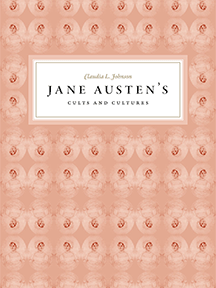By Victoria Dolloff
Elizabeth and Darcy. Anne Elliot and Captain Wentworth. Emma and Knightly. After two hundred years, Jane Austen’s many characters are still vivid and relevant to the contemporary reader, inspiring book clubs, fan clubs, and movies that venerate the work and life of Jane Austen. Fans celebrate not only the author’s rich characters, but Jane Austen herself. Coined as ‘Janeites,’ these such doting fans have marked the enduring icon of Jane Austen for decades.
This timeless adoration is one that Claudia Johnson explores in her newest book, Jane Austen’s Cults and Cultures (University of Chicago Press, 2012), which has been named the winner of the 2013 Phi Beta Kappa Christian Gauss Award for scholarly and critical literature.
Jane Austen’s Cults and Cultures is one of several books Johnson has written pertaining to Austen and eighteenth to early nineteenth century literature. The Murray Professor of English Literature at Princeton University, Johnson specializes in the novel in the eighteenth to early nineteenth century. Some of her other works include Jane Austen: Women, Politics, and the Novel (University of Chicago Press, 1988), Equivocal Beings: Politics, Gender and Sentimentality in the 1790s (University of Chicago Press, 1995), and critical editions of the Jane Austen novels. Much of her work connects literature to culture in the time of the novel and, as in this latest book, the time of the reader.
In Jane Austen’s Cults and Cultures, Johnson explores the essence of how and why Jane Austen has been an adored figure through the decades—a figure who has seemingly transformed from a quiet author to a divine heroine herself. The book starts in the first chapter looking at Jane Austen’s body, considering portraits of Austen and their influence on the reader’s perception of her and her work. The second, third, and fourth chapters titled Jane Austen’s Magic, Jane Austen’s World War I, and Jane Austen’s World War II respectively, explore the reaction to Austen and her novels through the Victorian era and the world wars. In the fifth and final chapter, Johnson looks at Jane Austen’s home as an established museum in Chawton and how this, in turn, encapsulates readers’ intense feelings for Austen and her novels. Essentially, Johnson explores the perception of Austen’s work throughout time and how Jane Austen as an enduring phenomenon speaks not only to her work itself, but also to the demands and needs of the reader and the persistence of her themes. Overall, Jane Austen’s Cults and Cultures looks to the legacy of Jane Austen and the culture that has transcended her pages.
Since the release of Jane Austen’s Cults and Cultures in 2012, Johnson’s book has been well received. Along with the Phi Beta Kappa’s Christian Gauss Award, Johnson has won the Choice Magazine Outstanding Academic Title award. Reviews of the book have also been positive, praising Cults and Cultures with comments like “witty,” “colorful,” and “richly informative.”
Praise for Jane Austen’s Cults and Cultures
Aia Hussein-Yousef from Austenprose.com gave Johnson five out of five stars, calling her book “both scholarly and accessible.”
Katharine Reeve of Times Higher Education touched on Claudia Johnson’s “wide range of fascinating sources and key texts.”
The Economist calls Johnson’s passages “revealing.”
For more information about this year’s book award winners, visit the Phi Beta Kappa website.
Victoria Dolloff is a senior at Fairfield University majoring in studio art. Fairfield University is home to the Zeta of Connecticut chapter of Phi Beta Kappa.




